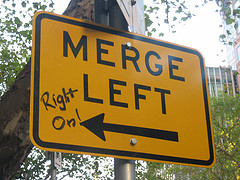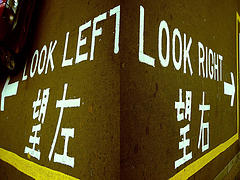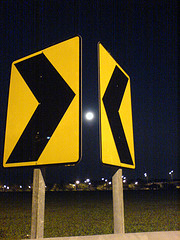Honton ko si kar dekhiye pachtaiye ga aap
Hangame jaag uthte hain aksar ghuttan ke baad
 Any anodyne effect this sher might have had on me was lost forever when my neo-Trotskyite friend decided to give me his interpretation of it. I didn’t ask for it, but there it was. A multi-headed hydra called “having coffee†– where the conversation starts off polite, turns to prittle-prattle , turns to poetry, turns to politics, turns to polemics, turns to punches. Lucky for me, he hits like a girl.
Any anodyne effect this sher might have had on me was lost forever when my neo-Trotskyite friend decided to give me his interpretation of it. I didn’t ask for it, but there it was. A multi-headed hydra called “having coffee†– where the conversation starts off polite, turns to prittle-prattle , turns to poetry, turns to politics, turns to polemics, turns to punches. Lucky for me, he hits like a girl.
“Religious extremism is the new communism,â€
he hissed, spraying spittle in all directions. I laughed. He carried on, unperturbed but passionate:
“The poor man has found his outlet – the injustice, the exploitation, the degradation, the desperation he’s suffered has found its expression. Islam, like communism, is based on egalitarian principles and promises them justice and equality. You think religious extremism has got anything to do with religion? It is nothing but the collective voice of a people who’ve been wronged their whole lives.â€
Somehow this gave me goose bumps and I quickly gulped down the latte in hope of thawing the chill his words left. It didn’t work and I got to thinking about Pakistan and Pakistanis everywhere.
Religious extremists in Pakistan can come from all walks of life but a sizeable chunk belongs to the poorer section of the society. Pakistani immigrants and expatriates living in the West also make up a significant portion. Why are these two groups more prone to religious extremism and terrorism? Was it that, time and again, they were discriminated against and shunted to silence? Did the exclusion leave such bitterness that it got bottled up inside for so long – so long that it is now, quite literally, exploding?
 In Pakistan’s context, the implication that religious extremism is connected to poverty and disfranchisement has been made not with a bang but a whimper (pun unintended). I think this concept needs to be forced to the fore. Many in the corridors of power are finding it convenient to ignore the ‘real’ reasons leading to Islamic radicalism, as that may point the j’accuse finger in their direction. But let’s briefly look at why a 19 year old Pakistani boy picks up a Kalashnikov or why a 37 year old father of three straps explosives around his waist.
In Pakistan’s context, the implication that religious extremism is connected to poverty and disfranchisement has been made not with a bang but a whimper (pun unintended). I think this concept needs to be forced to the fore. Many in the corridors of power are finding it convenient to ignore the ‘real’ reasons leading to Islamic radicalism, as that may point the j’accuse finger in their direction. But let’s briefly look at why a 19 year old Pakistani boy picks up a Kalashnikov or why a 37 year old father of three straps explosives around his waist.
It’s no secret that democratic institutions in Pakistan are in a frail state, if at all alive.
And then there is no Left or not much left of it. (The Communist Party of India could arguably be a good example of the importance of such a “balance of power†– on the domestic front at least.) In Pakistan very few avenues are open to the poor in need of some succour or just in need of voicing their distress. So, what happens? Under a dictatorship, and with no diversity of political parties to choose from, the poor, frustrated man turns to the radical Right – the Mullahs and their might.
Pakistani religious extremists living in the West dance to a slightly different tune. Feeling discriminated, displaced, alienated or plain confused – they crave to cling to a core, something that will anchor their sense of identity. Often times this comes in the form of religion. Sometimes its taken to an extreme. So, the religious radical turns to radicalism not out of a love for religion, but a deep hatred for those elements that he felt were unjust towards him (or his brethren.) Anti-Western sentiments do not transpire from Koranic verses, instead they’re born of the experiences one had in/of the West and the bitter taste that can leave in one’s mouth… body and soul.
 This is important. Scholars like Nichole Argo have accentuated the point: emotional and social ties precede the acquisition of ideology. Either our social situation has to be in the doldrums or our emotional condition so wounded that we take a religious ideology to an extreme. The media almost always portrays the religious extremist or terrorist as a gun-slinging gung-ho Islamist with a medieval mind and beard to boot. He is a dangerous, diehard jihadi on a mission to kill or be martyred trying. Such a description is like a donut-truth; the truth, the whole truth, with a hole in the truth (I forget what film this line is from). That hole is the real reasons people are pushed to accept a radicalised Islam, and these reason need to be better understood if we sincerely hope to curb extremism. Half-measures – like madrassa reformation – being implemented by our marginal-satisfiers might prove productive in that they’re broadening the narrow teachings of many religious seminaries. But they’re not preventing extremism. People, especially the poor and alienated, will continue to feel helpless in the face of a system they despise but can’t do anything to change. In fact, they may feel, and most do, that the measures being taken to tackle extremism are the spawn of the West, the very demon they wish to slay. So, they will continue feeling dejected and cheated. This inadvertently leads to the shift in their psyche that paves way for an extremist view.
This is important. Scholars like Nichole Argo have accentuated the point: emotional and social ties precede the acquisition of ideology. Either our social situation has to be in the doldrums or our emotional condition so wounded that we take a religious ideology to an extreme. The media almost always portrays the religious extremist or terrorist as a gun-slinging gung-ho Islamist with a medieval mind and beard to boot. He is a dangerous, diehard jihadi on a mission to kill or be martyred trying. Such a description is like a donut-truth; the truth, the whole truth, with a hole in the truth (I forget what film this line is from). That hole is the real reasons people are pushed to accept a radicalised Islam, and these reason need to be better understood if we sincerely hope to curb extremism. Half-measures – like madrassa reformation – being implemented by our marginal-satisfiers might prove productive in that they’re broadening the narrow teachings of many religious seminaries. But they’re not preventing extremism. People, especially the poor and alienated, will continue to feel helpless in the face of a system they despise but can’t do anything to change. In fact, they may feel, and most do, that the measures being taken to tackle extremism are the spawn of the West, the very demon they wish to slay. So, they will continue feeling dejected and cheated. This inadvertently leads to the shift in their psyche that paves way for an extremist view.
Some extremists may genuinely be harbouring a twisted interpretation of religion, and others may just be twisted by nature. But I believe that for most the acquisition of a radical religious ideology is triggered from a more fundamental feeling of victimisation, of feeling wronged, and/or being part of a harshly unjust system. In such cases religion offers unction, and a bandwagon-effect ensues whereby millions of disempowered and discriminated find a mouthpiece and meaning in the Right. Ironically, the factors thrusting them to the extreme right is born of leftist logic; an anti-establishment egalitarian cry for equal rights for the common citizen.
(How corrupt leaders exploit this feeling in the masses to further their own political interests is another matter. Also I would like to advise everyone to not turn this into a debate about Islam. It is about how the basic wrongs in society which cause an individual to adopt an extremist view, and how it is these wrongs that need to be focused if we wish to break free from the vicious cycle of militancy and dictatorship.)
Photo Credits: Flickr.com



















































Talking about Jamiat and Tableeghi Extremism, I would like to add further that Jamiat opposes Tableeghist and do you know the reason? Jamiat rejects Tableeghists because they think Tableeghis don’t talk about Jihad in their lectures nor they practise. Similarly Saudis whom you guys call Wahabis also reject Tableeghis so popular propaganda of putting Saudis and Tableeghis in same slot doesn’t hold water.
Then he writes: There are also schools of thought which support voilence as a means to achieve their objectives , for example some interpretations by Ibne Taimiya / Kharji movement etc
Again, utter ignorance! People, read before writing. Somehow equating ibn Taymiyyah to Kharjis is like saying water equals fire. Learn!
Ibrahim
Sheikh Hamza Yusuf, the well known American scholar had equated the Al-quaida terrorists with the kharjiites, in the wake of 9/11. This does not mean the AQ guys follow the *theology* of the Kharjiitex, but rather their modus operandi and the zeal with which the kharjis pursued and spread their brand of religion. May be the guy you are criticizing was thinking on the same lines. On one level, the connection seems absurd, but one another, in terms of the ferocity of their beliefs and also the exclusiveness that their philosophy produces (that only *they* are righteous, and others are all hell-bound), both the followers of Ibn-tamiyyah and the kharjiites seem to share some traits..
Salamalikum,
Word to word I agree with Abid. Adnan has already said what I wanted to say about Raza’s comments. This comment of Raza Rumi should be brought up again and again whenever he writes a post related to Islam because it depicts a very dangerous and ignorant mentality. This is exactly the mentality that makes every post of his with reference to Islam suspect. Just as I asked Qandeel, define radical/extremism for us.
How are some members of the cricket team extremists? Is it because they say a few kalamaat before their talks? Because they have grown a beard? Because they take prayer break during practice and pray in the dressing room? That they might preach Islam, which they should, but there is little to no evidence of the current (including Inzi) players preaching when they are given camera time. Is reverting to Islam from Christianity automatically means you’re an extremist?! List the extremist things they have done so that we know why you are calling them extremists?
Why is al-Huda extremist? Because Farhat Hashmi chooses to cover her face? Because they urge people to practice religion? To pray? To fast? To give zakat? To stay away from bidaat, wrong aqaaid, haram and urge people to strive to please Allah? What have the women of al-Huda done to be labeled as extremists? Let us know that too.
Is following the practices of Islam and preaching equals extremism in your dictionary?
Salamalikum,
Qandeel…I think you forgot to answer some very important questions that I had ask. Can you please reply.
Jamshad Nazar writes Some schools are more strict / voilent in their application of Islamic principles than others – for examples Wahabis versus Malkis
This is utter, utter igonrance. ‘Wahabi’ as it’s used by most and is used here (i.e. strict) is a revivalist movement of sorts while Malikis is a pure fiqhi mazhab like Hanafis, Shafis, Hanbalis. There is absolutely no connection, for you can have Maliki Wahabis and indeed there are! My point is don’t write things when you don’t know what you’re talking about.
Then he writes: There are also schools of thought which support voilence as a means to achieve their objectives , for example some interpretations by Ibne Taimiya / Kharji movement etc
Again, utter ignorance! People, read before writing. Somehow equating ibn Taymiyyah to Kharjis is like saying water equals fire. Learn!
All these are mere superficial observations, which makes you write such ignorant proclamations.
Qandeel, Adnan, Munir Alvi, Raza you all make very good points , at some other point would love to read this all again, but Mudassir brings a good point
What about in todays context, how do we bring Imran Out, would I be extremist or idealist if i thought I should not eat dinner tonight for he may be hungry in Dera Ghazi Khan , Is Pakistan not my country why should he suffer and I sit here comfortably and write, any one What should we do, why is not every one wearing black ribbons, why people with conscious not disassociating from the government.
RE if you are still here read the CSIS report at http://www.teethmaestro.com ( again not published by GEO ARY or extremists. 10 billion dollars, and people below poverty level 35 %, 500 thousand children die every year, clean drinking water a luxury one cant have.
Any one what can we do ( action )
http://www.dreampakistan.blogspot.com